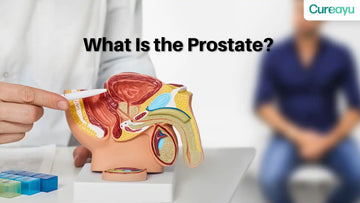The prostate is a vital gland in the male reproductive system, responsible for producing seminal fluid, which nourishes and transports sperm. Despite its significance, it often receives attention only when issues arise, particularly as men age. Prostate-related conditions, like benign prostatic hyperplasia (BPH), prostatitis, and prostate cancer, affect a large number of men globally and can have a profound impact on quality of life. Early awareness, understanding of symptoms, and lifestyle changes can contribute to better prostate health and even prevent some common issues. This article provides a comprehensive guide to understanding the prostate, common concerns associated with it, and essential tips for maintaining prostate health.
Also Read: Understanding Prostate Problems: Symptoms, Causes, and Solutions
What Is the Prostate?
The prostate is a small, walnut-sized gland situated between the bladder and the penis, just in front of the rectum. It surrounds the urethra, the tube that carries urine from the bladder to the penis. The primary function of the prostate is to produce a fluid that forms part of semen, which nourishes and protects sperm during ejaculation.
- Role in Reproduction – The prostate's fluid mixes with sperm from the testicles and fluids from other glands to create semen. This fluid slightly alkalizes the semen, protecting sperm from the acidic environment of the vagina, which helps sperm survive and travel to the egg.
- Hormonal Influence – The prostate’s growth and function are regulated by male hormones called androgens, the most significant being testosterone.
- Age-Related Changes – In younger men, the prostate remains relatively small, but as men age, it commonly enlarges due to hormonal changes, potentially causing urinary issues and other complications.
Concerns Related to the Prostate
There are several common concerns related to the prostate, each with distinct causes, symptoms, and treatments. Understanding these concerns can help in early diagnosis and treatment.
- Benign Prostatic Hyperplasia (BPH) – A non-cancerous enlargement of the prostate gland, BPH is common in older men and can cause urinary issues due to the gland pressing on the urethra.
- Common Symptoms – Increased frequency and urgency of urination, nocturia (waking up to urinate at night), and difficulty starting or stopping urination.
- Prostatitis – Inflammation of the prostate, which can be bacterial (acute or chronic) or non-bacterial. It affects men of all ages and can cause discomfort and urinary issues.
- Common Symptoms – Pain during urination, difficulty urinating, pelvic pain, and sometimes flu-like symptoms if caused by an infection.
- Prostate Cancer – The most common cancer in men after skin cancer, particularly affecting men over 50. Early detection through screening is essential for effective treatment.
- Common Symptoms – Often asymptomatic in early stages but may include pain, difficulty urinating, blood in the urine or semen, and erectile dysfunction in advanced stages.
Also Read: Essential Tips on How to Keep Your Prostate Healthy
What is Enlarged Prostate (BPH)?
Benign Prostatic Hyperplasia (BPH), or an enlarged prostate, occurs as the prostate gland grows with age. Although it is not cancerous, BPH can interfere with normal urinary function due to its proximity to the urethra.
- Connection to Aging – BPH is primarily age-related, with 50% of men aged 60 and above experiencing it to some degree. By age 85, up to 90% of men are affected by BPH.
- Hormonal Changes – Hormonal shifts in testosterone and estrogen levels in older men may contribute to the enlargement.
- Impact on Urinary Health – As the prostate enlarges, it can compress the urethra, causing a range of urinary symptoms that can affect quality of life and may require medical intervention.
Symptoms of an Enlarged Prostate
The symptoms of an enlarged prostate are mostly urinary and can significantly affect daily life. Recognizing these symptoms early is essential for seeking appropriate treatment.
- Frequent Urination – A constant need to urinate, especially at night, can disrupt sleep and impact daily activities.
- Urgent Need to Urinate – Often accompanied by a strong, sudden urge to urinate, sometimes leading to accidental leakage.
- Difficulty Starting and Stopping Urination – Some men experience hesitation when they try to start urinating, or they may have difficulty fully stopping the urine flow.
- Weak Urine Flow – The flow of urine can be slow, or there may be a sensation of dribbling, which can be inconvenient and embarrassing.
- Incomplete Bladder Emptying – This can create a sensation of always needing to urinate, even shortly after using the restroom.
Causes of Enlarged Prostate
While the exact cause of BPH is not well understood, there are several factors that may increase a man’s risk of developing an enlarged prostate.
- Age – The likelihood of BPH increases significantly with age. While it is rare in men under 40, it becomes quite common after age 50.
- Family History – Men with close family members who have experienced BPH are more likely to develop the condition.
- Lifestyle and Diet – A diet high in fats and low in vegetables, coupled with a sedentary lifestyle, may increase the risk of BPH and other prostate issues.
- Obesity – Excess body weight, particularly around the waist, can increase the risk of BPH.
- Underlying Health Conditions – Conditions like heart disease and diabetes are associated with an increased risk of BPH, possibly due to the systemic effects of these conditions on bodily functions.
Also Read: What Causes Premature Ejaculation: Understanding, Symptoms, and Solutions
When to See a Doctor
Prostate health should be regularly monitored, especially if there are urinary changes or other discomforts. Seeking medical advice early can prevent the worsening of symptoms.
- If Experiencing Urinary Issues – Difficulty urinating, or pain associated with urination, warrants a doctor’s visit.
- Pain or Blood in Urine – These symptoms may indicate an infection or other serious condition requiring medical attention.
- Frequent Nocturnal Urination – If waking up multiple times a night to urinate is disrupting your sleep, it may be a sign of BPH or another condition.
- Family History of Prostate Issues – Regular screenings, such as PSA (prostate-specific antigen) tests, are recommended for those with a family history of prostate cancer or BPH.
- Erectile Dysfunction or Other Changes – Sexual health symptoms like erectile dysfunction can sometimes be linked to prostate issues, especially if combined with urinary symptoms.
Prevention Tips for Prostate Health
Maintaining a healthy prostate can be supported by lifestyle changes and a proactive approach to healthcare.
- Healthy Diet – Incorporate a diet rich in fruits, vegetables, and omega-3 fatty acids. Foods high in antioxidants, like berries and tomatoes, can reduce inflammation and protect prostate health.
- Regular Exercise – Physical activity helps maintain healthy hormone levels, improve circulation, and prevent obesity, all of which benefit prostate health.
- Avoid Smoking and Alcohol – Smoking and excessive alcohol consumption can contribute to inflammation and increase the risk of BPH and other prostate conditions.
- Stay Hydrated – Drinking plenty of water throughout the day keeps the urinary system functioning optimally and flushes out potential irritants.
- Regular Check-Ups – Men over the age of 50 should schedule regular prostate screenings. Those with a family history of prostate issues may need to begin screening earlier.
- Manage Stress – Chronic stress can exacerbate inflammation, making lifestyle changes to reduce stress beneficial for prostate health.
Conclusion
While prostate health can be a sensitive topic, understanding its importance and being proactive about care can greatly benefit men’s overall health and quality of life. Knowledge of prostate anatomy, common conditions, and early symptoms are vital tools for men to maintain their well-being. By incorporating lifestyle changes, regular screenings, and healthy habits, men can take charge of their prostate health and potentially avoid complications associated with age and other risk factors.








